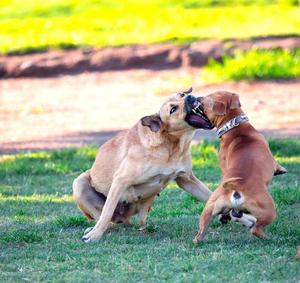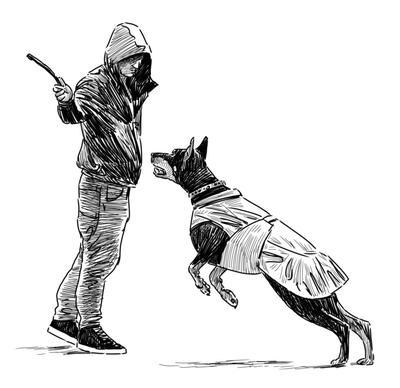California Penal Code § 597.5 PC makes it a crime to own, possess, keep or train a dog for the purpose of having it engage in dogfighting. The statute also prohibits being present where a dogfight is taking place.
Specifically, Penal Code 597.5 PC, the state’s dogfighting law, provides for criminal penalties for any of the following behaviors:
- Owning, possessing, keeping or training any dog, with the intent that it will engage in an exhibition of fighting with another dog;
- Causing any dog to fight with another dog, or causing any dogs to injure each other, for amusement or gain;
- Permitting either of the above two acts to be done on any premises under your control, or aiding and abetting either of those two acts; or
- Knowingly and intentionally being present at a dog fight or a place where preparations are being made for a dog fight.1
The most famous case of dogfighting in recent history is probably that of NFL star Michael Vick.
Vick was charged with dogfighting as a federal crime because his operation crossed state lines. He pled guilty and was sentenced to 23 months in federal prison.2
Examples
Here are some examples of people who could be prosecuted for dogfighting in California:
- A man earns extra money by adopting pit bulls from local animal shelters, training them to fight other dogs, and selling them to organizers of dogfights.
- A woman pays a $10 cover charge to attend a dog fight held in the courtyard of a bar.
- A landlord rents warehouse space to a group of people who hold dogfights there every Saturday night.
Penalties
If you are a spectator at a dog fight, or are knowingly present at a place where preparations are being made for a dog fight, you will be charged with PC 597.5 dogfighting as a misdemeanor.3
The penalties for misdemeanor dogfighting are up to one (1) year in county jail, and/or a fine of up to five thousand dollars ($5,000).4
All other violations of California’s dogfighting statute are felonies in California law. A felony dogfighting conviction can lead to sixteen (16) months, two (2) years or three (3) years in jail, and/or a fine of up to fifty thousand dollars ($50,000).5
Legal defenses
Many dogfighting defendants are caught off-guard when they learn how seriously the state of California takes this offense.
But this is not the kind of thing that fazes an experienced California criminal defense attorney. A lawyer who has defended dogfighting cases before has probably seen many of the different scenarios that can give rise to these charges—and s/he will know the best legal defenses for your case.
Some of the most common effective defenses include showing that:
- The police who made the arrest violated California’s search and seizure laws;
- There is no proof of ownership of the dog(s) involved; and/or
- You lacked criminal intent.
In this article, our California criminal defense attorneys explain the following:
- 1. The Legal Definition of Dogfighting in California
- 2. Penalties for Penal Code 597.5 PC Dogfighting
- 3. Legal Defenses to California Dogfighting Charges
- 4. PC 597.5 Dogfighting and Related Offenses
- 4.1. PC 597 animal cruelty
- 4.2. PC 597.7 leaving an animal in an unattended vehicle
- 4.3. PC 192(b) involuntary manslaughter
- 4.4. PC 337a bookmaking/pool-selling/wagering
- 4.5. PC 399 failing to control a dangerous animal
- 4.6. PC 372 and 373a creating a public nuisance
- 4.7. HS 122335 unlawful tethering of a dog
If, after reading this article, you would like more information, we invite you to contact us at Shouse Law Group.

Simply raising a dog for dogfighting is enough to violate Penal Code 597.5 PC.
1. The Legal Definition of Dogfighting in California
The legal definition of dogfighting in California is complicated. There are several distinct behaviors that can lead to charges under California Penal Code 597.5 PC.
These are:
Owning, possessing, keeping or training any dog for dogfighting
The first way to violate California’s dogfighting law is to
- own,
- possess,
- keep, or
- train,
any dog, with the intent that it will participate in an exhibition of fighting with another dog (in other words, a dog fight).6
You can violate this section of California’s dogfighting law even if the dog in question never actually participates in dog fights. All that matters is that you intend for it to engage in one.7
Example: Julio’s friend Stanley has been making good money by buying pit bull puppies, raising them in his home, hiring trainers to train them to fight other dogs, and then selling them to groups that use the dogs in organized dog fights.
Julio thinks this might be a promising business opportunity for him too. So he buys several puppies and keeps them for several months. He makes contact with a trainer who will start training them to fight once they are old enough.
Julio owns dogs intending that they will be used for dogfighting eventually. Thus, he is already guilty of violating California’s dogfighting statute—even though his puppies have not been in an actual fight yet.
Also, you do not have to actually own the dog(s) in question to be guilty of dogfighting under this section of the law.
Example: Let’s say Julio from the example above needs to go out of town for several weeks. He asks his girlfriend Emma if she will keep his pit bull puppies at her house for him while he is gone.
Emma hates dogs and is reluctant. But then Julio promises her a share of the money he’ll make from selling the dogs to the dogfighting ring if she will keep them for him.
If Emma agrees, she may be guilty of dogfighting under Penal Code 597.5 PC—for “keeping” and/or “possessing” dogs with the intent that they would participate in dog fights.
Causing dogs to fight with or injure each other for amusement or gain
You can also violate California’s dogfighting law by causing any dog to fight with another dog, or causing any dogs to injure each other, for either:
- Amusement, or
- Gain.8
This section of California’s dogfighting law covers the behavior we would most quickly recognize as dogfighting—that is, causing dogs to engage in a fight.
But it is also important to note that not every situation where two dogs fight or harm each other is a legitimate basis for dogfighting charges. You only violate California’s dogfighting law if you are motivated by either amusement or gain.9
Example: Nina has gotten on the wrong side of some of her neighbors by reporting them to the police for loud parties late at night.
One day Nina is confronted in her front yard by Rick, one of the neighbors she has offended. Rick has Bouncer, his vicious-looking German shepherd, with him.
Rick says some threatening things to Nina. He then lets Bouncer off his leash. Bouncer advances toward Nina, growling.
Worried for her safety, Nina opens her front door. Her own Shiba Inu dog, Jackie, comes running out. Jackie senses that Bouncer is threatening Nina and attacks Bouncer.
Nina is probably not guilty of dogfighting for causing Jackie to fight with Bouncer. She was not acting for amusement or gain but was instead worried about her own safety. (She could also possibly use the legal defense of self-defense to defend herself against dogfighting charges.)
Permitting or aiding and abetting any of the aforementioned acts

You are guilty of dogfighting if you allow a dog fight to take place on property you own or control.
You can also be convicted of dogfighting if you either:
- Permit any of the aforementioned acts (that is, owning, keeping or training dogs for fighting, or causing actual dog fights) to be done on any premises in your charge or control; or
- Aid or abet any of the aforementioned acts.10
The legal definition of “aiding and abetting” is:
- Aiding, promoting, encouraging or instigating the commission of a crime, by either act or advice;
- With knowledge of the perpetrator’s unlawful purpose; and
- With the intent or purpose of committing or encouraging or facilitating the crime.11
Example: A prominent criminal street gang runs a dogfighting ring that raises and trains dogs to fight, stages the fights, and makes money off of the bets spectators place on the fights.
Patty is an animal behavior expert. Members of the dogfighting ring regularly consult her on how to best train the dogs to be champion fighters. Patty doesn’t work with the dogs directly but regularly offers the ring members her advice, for a hefty fee.
Patty may be prosecuted under California’s dogfighting law for aiding and abetting the crime of dogfighting.

It is all too easy for prosecutors to charge someone with dogfighting on an “aiding and abetting” theory.
One of the most surprising features of Penal Code 597.5 PC is the provision that you can be guilty of dogfighting for merely letting someone else use a space that you own or control for dogfighting purposes.12
So, in other words, you can be prosecuted under this law for renting property that you own to someone who is raising dogs for a dog fight, or for letting someone use property you rent or manage for dogfighting purposes.
Example: Dave is the property manager for a shopping center that a large vacant storefront.
A cousin of his offers him a large sum of money if he will let him and a friend use that space one night for a fight between the cousin’s Rottweiler and the friend’s pit bull. The two of them have made a bet on which dog will win.
Dave agrees. This makes him criminally liable for violating California’s law against dogfighting.
Being a spectator at, or present at preparations for, a dog fight

Spectators at dogfights can also be prosecuted under PC 597.5.
Finally, you can be guilty of dogfighting if you either:
- Are knowingly and intentionally present at a dog fight; or
- Are knowingly present as a spectator at any place where preparations are being made for a dog fight, with the intent to be present at the fight.13
Example: Charlie hears that a dog fight is going to take place in the basement of a night club. Intrigued, he goes to the club that night and pays a cover charge to get into the basement.
Several dozen people are already there, drinking and talking. Before the dog fight begins, the police bust in and arrest everyone.
Charlie and the other spectators can all be prosecuted under California Penal Code 597.5 for being present at a place where preparations were being made for a dog fight, with the intent to watch the fight.
2. Penalties for Penal Code 597.5 PC Dogfighting
The penalties for violating California’s dogfighting law vary depending on the form of the crime of dogfighting with which you are charged.
2.1. Misdemeanor dogfighting
Dogfighting is a misdemeanor—a less serious offense—when the behavior for which you are charged is being a spectator at a dog fight, or being present at a place where preparations were being made for a dog fight.14
In this case, the potential penalties are:
- Misdemeanor (summary) probation;
- Up to one (1) year in county jail; and/or
- A fine of up to five thousand dollars ($5,000).15
2.2. Felony dogfighting

Training a dog to participate in dog fights is a form of felony dogfighting.
All other acts that are prohibited by Penal Code 597.5 PC are California felonies.16
The potential penalties for felony dogfighting are:
- Felony (formal) probation;
- Sixteen (16) months, two (2) years or three (3) years served in county jail under California’s realignment program; and/or
- A fine of up to fifty thousand dollars ($50,000).17
2.3. Asset forfeiture
California law also provides for a penalty of asset forfeiture for those convicted of dogfighting.
If you are convicted of either misdemeanor dogfighting or felony dogfighting, the prosecutor may initiate a proceeding to seize any property that you acquired through the crime of dogfighting. This could include:
- Real estate;
- Personal property;
- Profits and proceeds; and/or
- Any equipment acquired or used in the course of dogfighting.18
Example: Alfonso owns and trains pit bulls to participate in dog fights. His dogs repeatedly end up being champions, and he earns several hundred thousand dollars from cash prizes received when his dogs win their fights.
Eventually Alfonso is arrested and charged under Penal Code 597.5. He is convicted of multiple counts of felony dogfighting.
Alfonso receives a jail sentence and a fine of $50,000.
In addition, under the asset forfeiture provision of California’s dogfighting statutes, the government seizes all of the money in Alfonso’s bank accounts that can be traced to his dogfighting earnings, and all of the equipment he used to house and train his dogs.
3. Legal Defenses to California Dogfighting Charges
The harsh penalties for dogfighting in California come as a shock to many defendants.

People who own certain breeds of dog, especially pit bulls, are often unfairly accused of dogfighting.
Many people see dogfighting as a serious sport and a legitimate leisure activity grounded in tradition. And, in fact, recreational dogfighting dates back to ancient Rome!19
Plus, California’s dogfighting laws are written broadly enough that people can face charges for this offense even if they were only in the vicinity of, or peripherally involved in, a dog fight.
If you are facing charges for this crime, one or more of the following common legal defenses may come in handy:
The police violated California search and seizure laws
Dogfighting cases are often built on arrests made and evidence acquired at the scene of a dog fight. But sometimes police will:
- Enter the site of a dog fight without a California search warrant;
- Enter the site of a dog fight with a California search warrant that is invalid; and/or
- Conduct a search outside the area covered by a warrant.
If any of these occurred in your case, then evidence acquired at the scene will not be admissible against you.20 In practice, this can lead to the charges being dismissed.
There is no proof of ownership of the dogs involved
One way to violate Penal Code 597.5 PC is to “own” dogs that are intended for use in dogfighting.21

You cannot be found guilty of felony dogfighting as a dog owner unless prosecutors can prove that you actually owned the dogs in question.
But most dogs that participate in dog fights are unlicensed. As a result, it can be difficult for the prosecution to prove that you were the individual who “owned” (or possessed, kept or trained) a dog for dogfighting purposes.
As Long Beach criminal defense attorney John Murray22 explains:
“Unless there is clear evidence tying you to the dog, there is a good chance that the prosecutor will only be able to prove that you were present as a spectator at a dog fight. This will still mean that you are guilty of dogfighting—but only as a misdemeanor, not as a felony.”
You lacked criminal intent
Sometimes people are accused of dogfighting because a neighbor or acquaintance calls the police and reports that s/he is training dogs to be violent and aggressive.
This is particularly common with pit bull owners. Many people are biased against that breed, and if you happen to own pit bulls, your neighbor may out-and-out fabricate claims that you are involved with dogfighting.
But you are only guilty of dogfighting if the prosecutor can prove—beyond a reasonable doubt—that you intended for your dogs to participate in dog fights.23
There are plenty of other reasons why a person might raise certain breeds and even train them to be selectively aggressive. For example, you may have been training a dog to be a watchdog against burglars or coyotes.
Similarly, you cannot be convicted of being a spectator at a dog fight unless you were there intentionally. Many dog fights take place at bars or clubs. You may have gone to the bar or club without any knowledge of or interest in watching the dog fight—but then been arrested because you were unlucky enough to be on the scene when police arrived.
4. PC 597.5 Dogfighting and Related Offenses
Some of the most common related offenses to California dogfighting include:
4.1. PC 597 animal cruelty

Penal Code 579 animal cruelty is often charged along with Penal Code 597.5 dogfighting.
Under Penal Code 597 PC, “animal cruelty” charges can be brought against someone who does any of the following:
- Maliciously and intentionally maims, mutilates, tortures or wounds an animal;
- Maliciously and intentionally kills an animal;
- Deprives an animal of necessary food, drink or shelter; or
- Rides, drives or overworks an animal that is unfit for labor.24
It is very common for defendants to face charges for both dogfighting under California Penal Code 597.5, and animal cruelty under California Penal Code 597. For example, the prosecutor might allege that you mistreated dogs that you were raising or training for dogfighting.
Like dogfighting under Penal Code 597.5 PC, animal cruelty is a wobbler. Charged as a felony, it carries a sentence of sixteen (16) months, two (2) years or three (3) years in county jail.25
Misdemeanor animal cruelty carries a sentence of one (1) year in county jail. And either felony or misdemeanor animal cruelty can lead to a fine of up to twenty thousand dollars ($20,000).26
4.2. PC 597.7 leaving an animal in an unattended vehicle
California law, Penal Code 597.7 PC, prohibits leaving an animal in an unattended vehicle. You violate this law if you leave an animal in an unattended motor vehicle under conditions that endanger its health or well-being (such as heat, cold or lack of ventilation).27
This crime is a misdemeanor. For a first offense of leaving an animal in an unattended car, where the animal doesn’t suffer great bodily injury, the only penalty is a fine of up to one hundred dollars ($100).28
But if this is your second or subsequent conviction of this offense, or the animal suffers great bodily injury, then you may receive up to six (6) months in county jail, and/or a fine of up to five hundred dollars ($500).29
4.3. PC 192(b) involuntary manslaughter
It sometimes happens that defendants are charged with both dogfighting and Penal Code 192(b) PC involuntary manslaughter.30
Involuntary manslaughter is charged when a defendant is alleged to have unintentionally killed another person while committing a crime.31
If you are accused of owning or keeping a vicious dog for use in dog fights, and that dog attacks and kills another person, then you may face involuntary manslaughter charges, with dogfighting as the underlying crime.
Involuntary manslaughter is a felony. It carries a potential sentence of two (2), three (3) or four (4) years.32
4.4. PC 337a bookmaking/pool-selling/wagering
The whole point of dogfighting for many people lies in wagering on the outcomes of the fights. Thus, it is common for dogfighting defendants to also face charges under Penal Code 337a PC, California’s bookmaking/pool-selling/wagering law.
Illegal “bookmaking” in California includes a wide range of behavior associated with betting on sporting events, including:
- Acting as a “bookie”;
- Selling shares in a betting pool;
- Letting other people use your property for these purposes;
- Recording or registering bets; and
- In some cases, simply wagering on the outcome of an event.33
Violations of California’s bookmaking law can be charged as either misdemeanors or felonies.34
4.5. PC 399 failing to control a dangerous animal
Penal Code 399 PC failing to control a dangerous animal is charged when a dog or other animal either kills a person or causes them serious bodily injury.
In order for a defendant to be guilty of PC 399, s/he needs to have known that the dog was dangerous. S/he also needs to have either willfully let the dog run free or else failed to use ordinary care in keeping the dog.35
So if a dog trained for dogfighting displays aggression toward humans, and that dog then gets loose and injures someone, you could face charges under this law.
Failing to control a dangerous animal is a wobbler if the victim suffers only serious bodily injury and a felony if the victim is killed.36
4.6. PC 372 and 373a creating a public nuisance
Creating or maintaining a public nuisance under Penal Code 372 and 373a PC is a misdemeanor crime.37
Creating a public nuisance sometimes makes sense as a plea bargain from dogfighting charges.
Let’s say you are charged with dogfighting for keeping a number of potentially vicious dogs, but the prosecutors do not have strong evidence showing that you intended to use those dogs for fighting. In that case, prosecutors may agree to reduce the charges to creating a public nuisance, which carries lighter penalties and less of a stigma.
4.7. HS 122335 unlawful tethering of a dog
Under Health & Safety Code 122335 HS, “unlawful tethering of a dog” is a crime. Under this law, you are not allowed to tie a dog to a stationary object under most circumstances.38
Illegal tethering of a dog may be charged as either an infraction or a misdemeanor.39
In reality, many people do tie or tether their dogs. Thus, defendants in dogfighting cases may find themselves facing charges for this crime too, if the police find evidence that they engaged in this practice.
Legal References:
- Penal Code 597.5 PC – Fighting dogs; felony; punishment; spectators; exceptions. The statute reads:
(a) Any person who does any of the following is guilty of a felony and is punishable by imprisonment pursuant to subdivision (h) of Section 1170 for 16 months, or two or three years, or by a fine not to exceed fifty thousand dollars ($50,000), or by both that fine and imprisonment: (1) Owns, possesses, keeps, or trains any dog, with the intent that the dog shall be engaged in an exhibition of fighting with another dog. (2) For amusement or gain, causes any dog to fight with another dog, or causes any dogs to injure each other. (3) Permits any act in violation of paragraph (1) or (2) to be done on any premises under his or her charge or control, or aids or abets that act. (b) Any person who is knowingly present, as a spectator, at any place, building, or tenement where preparations are being made for an exhibition of the fighting of dogs, with the intent to be present at those preparations, or is knowingly present at that exhibition or at any other fighting or injuring as described in paragraph (2) of subdivision (a), with the intent to be present at that exhibition, fighting, or injuring, is guilty of an offense punishable by imprisonment in a county jail not to exceed one year, or by a fine not to exceed five thousand dollars ($5,000), or by both that imprisonment and fine. (c) Nothing in this section shall prohibit any of the following: (1) The use of dogs in the management of livestock, as defined by Section 14205 of the Food and Agricultural Code, by the owner of the livestock or his or her employees or agents or other persons in lawful custody thereof. (2) The use of dogs in hunting as permitted by the Fish and Game Code, including, but not limited to, Sections 4002 and 4756, and by the rules and regulations of the Fish and Game Commission. (3) The training of dogs or the use of equipment in the training of dogs for any purpose not prohibited by law.
- Animal Legal Defense Fund, Animal Fighting Case Study: Michael Vick.
- Penal Code 597.5 PC – Fighting dogs; felony; punishment; spectators; exceptions, endnote 1, above.
- Same.
- Same. See also Penal Code 1170(h) PC. (“(h)(1) Except as provided in paragraph (3), a felony punishable pursuant to this subdivision where the term is not specified in the underlying offense shall be punishable by a term of imprisonment in a county jail for 16 months, or two or three years.”)
- Penal Code 597.5 PC – Fighting dogs; felony; punishment; spectators; exceptions, endnote 1, above.
- Same.
- Same.
- Same.
- Same.
- California Jury Instructions – Criminal (“CALJIC”) 3.01 – Aiding and Abetting [applies to aiding and abetting the crime of dogfighting]. (“A person aids and abets the [commission] [or] [attempted commission] of a crime when he or she: (1) With knowledge of the unlawful purpose of the perpetrator, and (2) With the intent or purpose of committing or encouraging or facilitating the commission of the crime, and (3) By act or advice, [or, by failing to act in a situation where a person has a legal duty to act,] aids, promotes, encourages or instigates the commission of the crime. [A person who aids and abets the [commission] [or] [attempted commission] of a crime need not be present at the scene of the crime.] [Mere presence at the scene of a crime which does not itself assist the commission of the crime does not amount to aiding and abetting.] [Mere knowledge that a crime is being committed and [in the absence of a legal duty to take every step reasonably possible to prevent the crime,] the failure to prevent it does not amount to aiding and abetting.]”)
- Penal Code 597.5 PC – Fighting dogs; felony; punishment; spectators; exceptions, endnote 1, above.
- Same.
- Same.
- Same.
- Same.
- Same. See also Penal Code 1170(h) PC, endnote 5, above.
- Penal Code 598.1 PC – Dogfighting; forfeiture proceedings.
- See Monica Villavicencio, A History of Dogfighting, npr.org, July 19, 2007.
- Mapp v. Ohio (1961) 367 U.S. 643, 655. (“We hold that all evidence obtained by searches and seizures in violation of the Constitution is, by that same authority, inadmissible in a state court.”)
- Penal Code 597.5 PC – Fighting dogs; felony; punishment; spectators; exceptions, endnote 1, above.
- Long Beach criminal defense attorney John Murray has a stellar reputation for criminal defense throughout Los Angeles and Ventura counties. He works closely with his clients and carefully chosen private investigators to build the best defense in cases ranging from dogfighting to manslaughter.
- Penal Code 597.5 PC – Fighting dogs; felony; punishment; spectators; exceptions, endnote 1, above.
- Penal Code 597 PC – Cruelty to animals.
- Same.
- Same.
- Penal Code 597.7 PC – Animal endangerment; confinement in unattended motor vehicle; violations and penalties.
- Same.
- Same.
- See, e.g., People v. Berry (1991) 1 Cal.App.4th 778, 781. (“Defendant appeals from a judgment entered after a jury found him guilty of involuntary manslaughter, keeping a mischievous animal, keeping a fighting dog, and cultivating marijuana. (Pen.Code, §§ 192, subd. (b), 399, and 597.5, subd. (a)(1) and Health & Saf.Code, § 11358.)”)
- Penal Code 192 PC – Manslaughter.
- Penal Code 193 PC – Voluntary manslaughter, involuntary manslaughter and vehicular manslaughter; punishment.
- Penal Code 337a PC – Bookmaking, pool-selling and wagering.
- Same.
- Penal Code 399 PC – Failing to control a dangerous animal.
- Same.
- Penal Code 372 PC – Public nuisance.
- Health & Safety Code 122335 HS – Unlawful tethering of a dog.
- Same.
